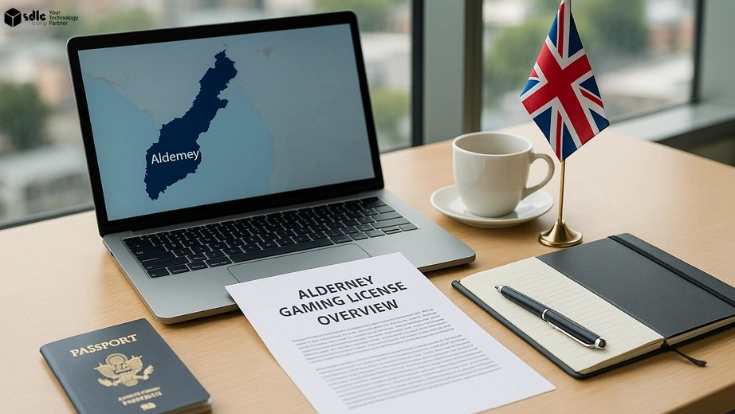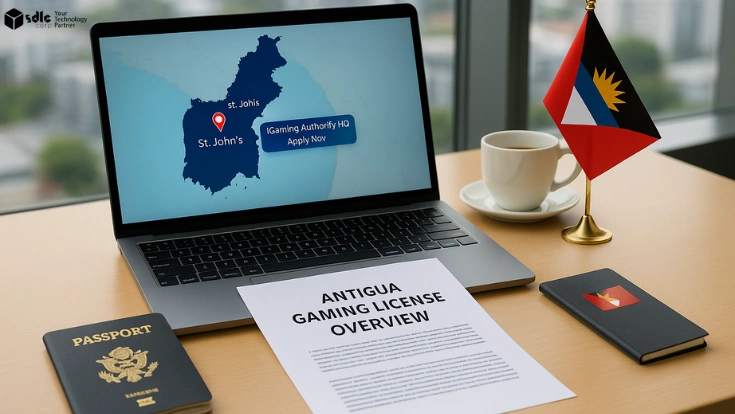Introduction
Brazil’s gambling industry is undergoing a significant transformation. With the introduction of Decree No. 11,816/2023, the country has officially legalized and regulated various forms of online gambling. This blog offers a complete guide to securing a gambling license in Brazil, including the latest legal updates, compliance requirements, and opportunities for international operators.
1. Overview of Brazil’s Gambling Market
The Brazilian gambling market is evolving rapidly. Once dominated by illegal operators and strict prohibitions, Brazil is now on the path to becoming a regulated and investor-friendly jurisdiction.
Brazil’s gambling revenue is expected to exceed USD 2.6 billion by 2026, driven by the legalization of fixed-odds betting and anticipated online casino regulation.
According to a 2024 government survey, more than 66% of adult Brazilians have shown interest in online gambling platforms.
Brazil’s huge population (over 214 million) and growing internet penetration make it one of the most lucrative untapped gambling markets.
Brazil’s market growth is also attracting major software providers, payment processors, and regulatory advisors globally.
2. Is Online Gambling Legal in Brazil?
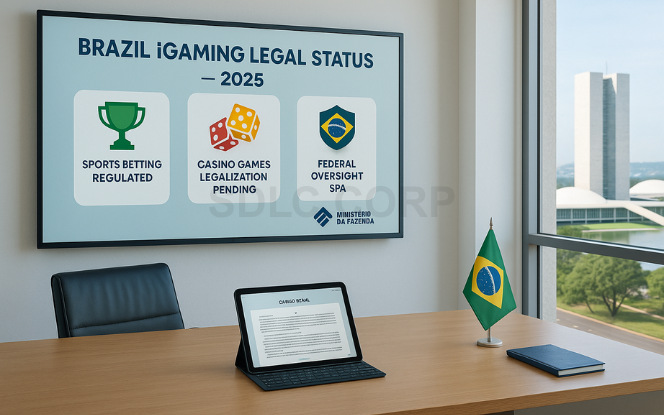
Until recently, online casino games were in a legal grey area. However, Decree No. 11,816/2023 has changed that by officially legalizing and regulating online casino operations.
1. Key Legislative Framework
Law No. 13,756/2018: Introduced fixed-odds betting and laid the groundwork for regulated iGaming.
Provisional Measure No. 1,182/2023: Established licensing and compliance rules for sports betting and online casinos.
Decree No. 11,816/2023 (effective December 2023):
Legalizes online casino games under the category of “jogos online.”
Covers games such as:
🎰 Slot machines
🎲 Roulette
🃏 Blackjack
👩💻 Live dealer games
Only licensed operators approved by the Secretaria de Prêmios e Apostas (Ministry of Finance) can offer these games.
2. Regulatory Requirements
To legally operate an online casino in Brazil, you must:
Obtain a license from the Secretaria de Prêmios e Apostas
Host platforms and servers within Brazil
Implement strong player protection systems (e.g., age verification, self-exclusion)
Adhere to AML and responsible gambling protocols
Pay all applicable taxes and national fund contributions
3. Who Regulates Gambling in Brazil?
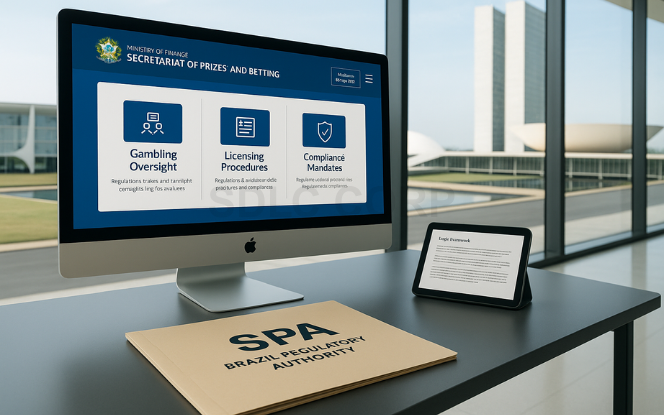
Gambling activities in Brazil are regulated by the:
Secretariat for Prizes and Betting (SPA)
Under the Ministry of Finance, SPA is responsible for:
Reviewing license applications
Monitoring operator conduct
Enforcing responsible gambling and anti-money laundering (AML) standards
Additional oversight bodies include:
Receita Federal: Handles tax obligations
Banco Central do Brasil: Monitors financial compliance
For a platform to be legally operational, it must receive explicit approval from SPA and comply with ongoing tax and AML frameworks.
4. Step-by-Step Guide to Get a Gambling License in Brazil
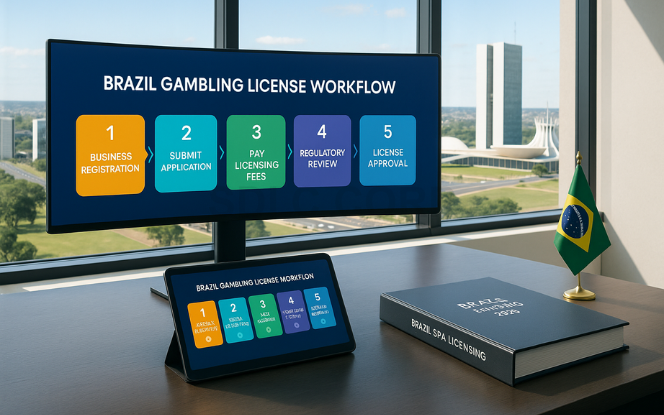
If you’re a foreign or domestic company interested in acquiring a Brazil online casino license, follow this step-by-step process:
Step 1: Incorporate a Local Entity
Register a Brazilian company or partner with a local representative.
Submit corporate bylaws, tax registration, and proof of address.
Step 2: Prepare Documentation
You’ll need:
Business plan
AML/KYC protocols
Responsible gaming measures
System architecture and game details
Proof of financial solvency
Step 3: Submit the Application
File online through SPA’s licensing portal (in development).
Applications are assessed within 90–180 days.
Step 4: Pay Licensing Fees
Fixed sports betting license fee: BRL 30 million (~USD 6 million)
Initial non-refundable application fee also required
Step 5: Undergo Technical Certification
Games and platform must be tested by authorized labs
Audit logs, payout algorithms, and RNGs must meet international standards
Step 6: Receive Approval and Operate
Once the application is approved, you can legally offer regulated gambling services in Brazil.
Receive expert guidance at every stage of your gaming license journey from documentation to approval. Our legal and compliance specialists make the process seamless across top jurisdictions. Need assistance? Talk to our team
5. Licensing Requirements for Different Business Models
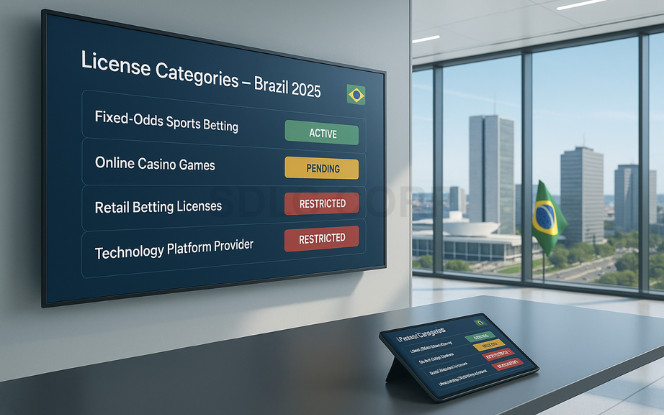
Brazil’s regulatory framework considers various stakeholders in the gambling ecosystem. Each has specific obligations.
Platform Providers
If you provide the platform (technology infrastructure) to third-party operators, you may require a separate license as a B2B service provider.
White-Label Operators
If you’re using a white-label solution, you still need to obtain a full operator license from the Ministry of Finance. Operating under someone else’s brand does not exempt you from regulatory scrutiny.
Affiliates
Affiliate marketers promoting gambling platforms in Brazil may not require a full operator license. However, they must comply with Brazilian advertising regulations and cannot receive revenue shares from unlicensed operators.
B2B Game Developers
Software providers and game studios targeting Brazilian operators should register as B2B providers, particularly if integrating directly into platforms licensed under Brazilian law.
6. Types of Gambling Licenses in Brazil
The following types of licenses are either available or expected to be formalized soon:
| License Type | Status | Notes |
|---|---|---|
| Sports Betting | ✅ Legal | Regulated under fixed-odds betting category. |
| Online Casino/iGaming | ✅ Legal | Legalized under Decree No. 11,816/2023. |
| Online Poker | ⚠️ Expected Soon | Currently unregulated, but reforms underway. |
| Fantasy Sports | ⚠️ In Progress | May get dedicated licensing in upcoming reforms. |
| eSports & Skill Games | ⚠️ Possible Future Category | Could be added under fixed-odds framework. |
Video Bingo and land-based casinos have been removed as they remain illegal or are outside the current licensing scope.
7. Cost of Gambling License in Brazil 2025
Licensing in Brazil requires a significant investment, especially for foreign operators.
| Fee Type | Amount (BRL) | USD Approx. |
|---|---|---|
| Application Processing | 200,000 | ~$40,000 |
| License Fee (Fixed-Odds Betting) | 30,000,000 | ~$6 million |
| Annual Renewal Fee | 6,000,000 | ~$1.2 million |
| Audit & Certification | 500,000+ | ~$100,000+ |
| Legal & Consulting Services | 250,000+ | ~$50,000+ |
Tip: Budget at least USD 150,000–300,000 to cover licensing and initial compliance.
8. Post-Licensing Obligations
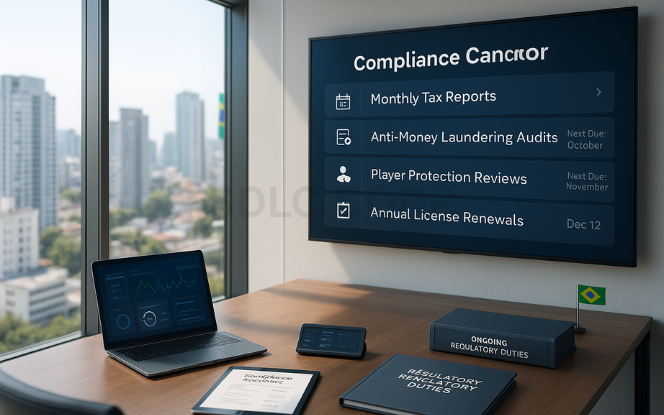
After receiving a license, operators must remain compliant with:
Responsible Gambling
Provide self-exclusion tools
Display odds clearly
Prevent underage gambling
KYC & AML Controls
Conduct identity checks
Use automated risk profiling
Report suspicious transactions to SPA
Financial Reporting
Monthly GGR reports
Tax declarations
Transaction audits
Failure to meet these obligations can result in suspension or revocation.
9. Gambling Taxation in Brazil
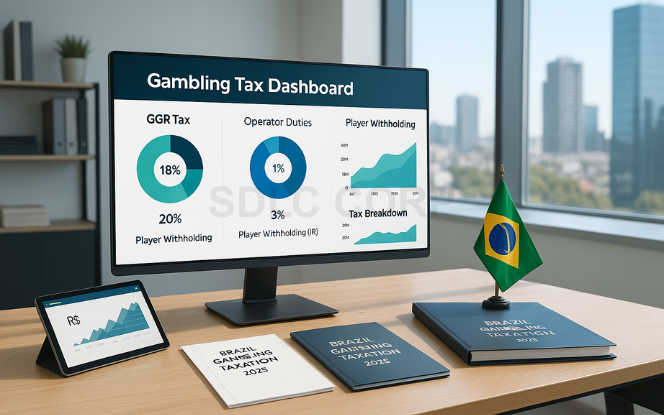
Operator-Level Taxation:
GGR Tax: 18% on gross gaming revenue
PIS/COFINS: 3.65% (federal social contributions)
Player-Level Taxation:
Winnings above BRL 2,112/month may be taxed
Tax collection framework evolving in 2025
Note: Tax deductions may apply to marketing expenses and affiliate commissions.
10. Challenges for International Operators
Operating in Brazil comes with a unique set of challenges:
Portuguese Language: All applications and compliance documents must be in Portuguese.
Currency Fluctuations: BRL/USD volatility can impact operating margins.
Payment Systems: Local methods like PIX must be integrated for success.
Certifications: Must use local or internationally recognized test labs.
Consider working with a licensed legal consultant or a white-label provider for smoother entry.
11. Expert Tips to Streamline Licensing
Hire Brazilian legal experts early
Choose certified software providers
Prepare documents in advance
Use automated compliance tools for AML/KYC
Join iGaming associations in LATAM
Being proactive saves time, avoids penalties, and ensures long-term success.
12. Future of Gambling in Brazil (2025–2030)
Brazil’s regulatory roadmap suggests a progressive expansion of gambling-related activities over the next five years.
1. Expansion of Licensing Categories
Online Poker: Expected to move from a grey area to a regulated industry.
Fantasy Sports: Will likely become a separate licensing category.
eSports & Skill Games: Under evaluation for fixed-odds classification.
2. Possible Land-Based Legalization
Although currently unlicensed, Brazil may consider resort-based land casino licensing in tourist zones to attract foreign investment and tourism.
3. Attracting International Operators
Foreign platforms are welcome to apply, provided they:
Establish a Brazilian legal entity
Comply with local hosting and tax laws
Demonstrate operational transparency
Conclusion
Brazil’s regulated gambling market is now one of the most promising in Latin America. With comprehensive laws in place and an open-door policy for both domestic and international operators, the time is right to enter the Brazilian iGaming space.
If you’re ready to enter this exciting market, consider consulting with experienced advisors to guide you through each step.
FAQ's
How much does a gambling license cost in Brazil?
The cost of a gambling license in Brazil is approximately BRL 30 million (~USD 6 million) for fixed-odds betting. Additional fees apply for application, annual renewal, and technical audits.
Is online gambling legal in Brazil in 2025?
Yes, online sports betting is legal and regulated in Brazil. Full regulation of online casinos is expected by the end of 2025.
Who regulates gambling in Brazil?
The Secretariat for Prizes and Betting (SPA) under Brazil’s Ministry of Finance is the main regulatory authority for gambling activities.
Can foreign companies apply for a gambling license in Brazil?
Yes, foreign operators can apply by incorporating a local entity or forming a partnership with a Brazilian representative.
What gambling activities are allowed in Brazil?
Legal activities include sports betting, lotteries, bingo, and (soon) online casino games, with regulations evolving under new laws.
What are the tax obligations for licensed operators in Brazil?
Operators pay an 18% GGR tax, plus PIS/COFINS contributions (~3.65%). Taxes are reported monthly to Receita Federal.



